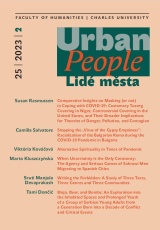Writing the Forbidden
A Study of Three Texts, Three Genres, and Three Communities
DOI:
https://doi.org/10.14712/12128112.4144Klíčová slova:
representation of community, freedom of expression, censorship, subalternity, postcolonial studiesAbstrakt
Three texts have been chosen for this study: Daya Pawar’s life-narrative Baluta, Perumal Murugan’s historical fiction One Part Woman, and Hansda Sowvendra Shekhar’s short story collection The Adivasi Will Not Dance. These writers hail from various subaltern groups of the Indian subcontinent, with diverse ethnicities. Besides subalternity, a significant thread connecting these texts is that the writers’ respective communities took offence at the portrayal of their cultures. This study explores the self-representation of the community through a close reading of the texts, and theorizes the relationship between the writer, narrator, characters, and the community. The paper analyses how the writer employs the community in the narrative and the role this plays in the respective spatiotemporal contexts of the texts. Given the chosen texts are of different genres – a Dalit life-narrative, a historical novel, and short stories – the paper also explores the genre-ic/form-al differences in the representation/use of the community.
Stahování
Publikováno
Jak citovat
Číslo
Sekce
Licence
Copyright (c) 2023 Sruti Manjula Devaprakash

Tato práce je licencována pod Mezinárodní licencí Creative Commons Attribution 4.0 .


